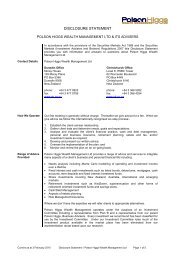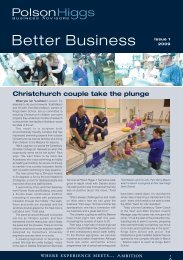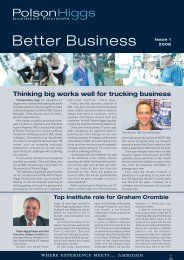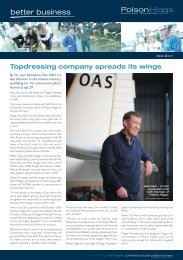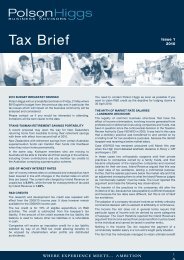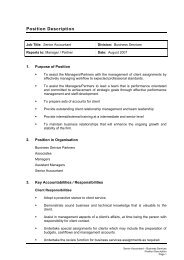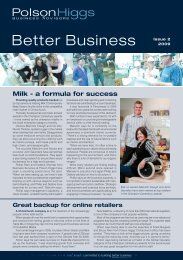through better environmental outcomes
through better environmental outcomes
through better environmental outcomes
You also want an ePaper? Increase the reach of your titles
YUMPU automatically turns print PDFs into web optimized ePapers that Google loves.
Maximising revenue<br />
<strong>through</strong> <strong>better</strong><br />
<strong>environmental</strong> <strong>outcomes</strong><br />
Steve Henry<br />
Centre for Sustainable Practice Wanaka
Centre for Sustainable Practice<br />
• Otago, NZ and international activity<br />
Industry 3<br />
Industry 2<br />
Industry 1<br />
Local and Regional Government<br />
Training<br />
Research
Win everywhere<br />
Economy / Profits<br />
Sustainable business<br />
� Profits<br />
� Taxes, R&D<br />
� Jobs<br />
� Expenditures<br />
� Training<br />
� Fair trade<br />
� Core values<br />
Environment / Planet<br />
Eco-Efficiency<br />
� Manufacturing efficiencies<br />
� Operations efficiencies<br />
� Product efficiencies<br />
� Smart design<br />
� Cradle-to-cradle, take-back<br />
� Beyond compliance<br />
� Restorative to nature<br />
Equity / People<br />
Ethical business<br />
� Internal employees<br />
� Human rights<br />
� Health & Safety<br />
� Empowerment<br />
� Respect, Caring<br />
� Local community<br />
� Rest of the world<br />
Source: Bob Willard “The Next Sustainability Wave”
Queenstown Lakes Sustainable<br />
Business Programme<br />
*140 business participants in 2009<br />
•“From why to how to”<br />
•Pick the low fruit, plan for high fruit<br />
and new fruit<br />
•Free workshops to fee for service<br />
contracts<br />
• 37 businesses in year long<br />
programme
Overpromising is dangerous
Visitor Satisfaction Research (2008)<br />
Environmental practices expected by international visitors<br />
ACTIVITIES<br />
TRANSPORT<br />
ACCOMMODATION<br />
Recycling<br />
79%<br />
Fuel efficient vehicles<br />
83%<br />
Recycling<br />
84%<br />
Conservation efforts<br />
72%<br />
Carbon emissions<br />
limiters<br />
59%<br />
Energy conservation<br />
72%<br />
Environmental<br />
enhancements<br />
68%<br />
Recycling<br />
54%<br />
Water conservation<br />
69%
The gap<br />
85% of visitors expect reductions in<br />
emissions by transport operators<br />
(Queenstown Visitor Monitor 2009)<br />
Stockholm re fueling facility<br />
Oil for dust suppression<br />
in Queenstown Lakes
Queenstown Lakes Biodiesel<br />
Consortium<br />
� 30 businesses with<br />
1.5million annual litres use<br />
� Brand value<br />
� Free from emissions tax of<br />
3.5c per litre from July 1 st<br />
� Long term price stability<br />
NZ’s first public biodiesel refuelling facility in<br />
Queenstown
Participating Businesses
Business motivation<br />
Profit<br />
Share price<br />
Growth<br />
Revenue<br />
Customer care<br />
Expense savings<br />
Competition<br />
Market share<br />
Leadership<br />
Governance<br />
Why<br />
Sustainable<br />
practice?<br />
Innovation<br />
Speed to market<br />
New markets<br />
Talent wars<br />
Productivity<br />
Motivation<br />
Brand image<br />
Managing risks<br />
Compliance<br />
Supply security
Risk of Losing Awakened Consumers<br />
• Until 2006: 70-80% of consumers said they<br />
were are switching to “green” companies,<br />
but only 10% actually did<br />
• 2006: 20% buy green<br />
(Sustainable brand study by egg, March 07)<br />
• 2008: 33% buy green<br />
(Globescan and McKinsey Study, 2008)<br />
Cover collage from Deloitte & Touche “Tax Wednesday” seminar, March 26, 2008
2<br />
Earlier stages in<br />
the supplier chain<br />
Introduce your organisation<br />
What do we depend on?<br />
Energy<br />
Water<br />
Transport<br />
Land, Building, Equipment<br />
Investment<br />
People<br />
Copyright © The Natural Step<br />
3<br />
What is left?<br />
Waste<br />
By-products<br />
What do we deliver?<br />
Products<br />
Services<br />
1<br />
Use of<br />
product/service
Reality
World Scientists‟ Warning, 2005 & 2007<br />
UN Millennium Ecosystem Assessment<br />
(2005)<br />
15 of 24 (60%) of the world‟s ecosystems<br />
are being degraded or used unsustainably<br />
“Human activity is putting such strain on the natural functions of Earth<br />
that the ability of the planet‟s ecosystems to sustain future generations<br />
can no longer be taken for granted.”<br />
IPCC Report (Feb 07)<br />
Signed by 2,500 of world‟s leading scientists<br />
90% probability that humans<br />
are causing climate change;<br />
more dire predictions<br />
Bob Willard „Masterslide Set‟
Ecological Overshoot<br />
Copyright © The Global Footprint Network
Silos<br />
ENVIRONMENT<br />
bearable<br />
Used under creaative commons<br />
licence<br />
SOCIETY<br />
Sustainable<br />
viable<br />
equitable<br />
ECONOMY
Reality<br />
Used under creaative commons licence<br />
Environment<br />
Society<br />
Economy
Warnings from Economists<br />
Stern Review Report (Oct 2006)<br />
Former World Bank chief economist, Nicholas Stern<br />
Economists’ Statement on Climate Change<br />
1. Cost of climate change mitigation:<br />
1% of annual global GDP by 2050<br />
if we act now; 5-20% if we act later<br />
(Bank bailout cost 5% of global GDP)<br />
2. Benefits of $2.5T if we act now;<br />
global depression if we do nothing<br />
3. Must stabilize GHGs:<br />
Use carbon taxes and / or<br />
a cap-and-trade system;<br />
deploy low-carbon technologies;<br />
80-90% below 1990 levels by 2050 in developed<br />
countries<br />
Bob Willard „Masterslide Set‟
Environment Is A „Top 10‟ Risk<br />
Threat of „Radical Greening' from stricter regulations,<br />
changes in consumer attitudes, and extreme<br />
weather<br />
Other Top 10 risks<br />
Regulatory and compliance risk;<br />
Consumer demand shifts; Global financial shocks;<br />
Aging consumers and workforce; Emerging markets;<br />
Energy shocks; Industry consolidation / transition;<br />
Execution of strategic transactions; Cost inflation<br />
“Properly approached, the process of risk management can add value even if,<br />
fortunately, the event never happens..”<br />
Ernst & Young: “Strategic Business Risk 2008” report, April 2008
The Squeeze<br />
Copyright © The Natural Step<br />
• Availability of natural resources<br />
• Health of natural systems / environment<br />
• Tolerance of green wash<br />
• Trust of entirely profit driven business<br />
• Population<br />
• Price of natural resources<br />
• Government intervention / regulation / taxes<br />
• Consumer pressure / level of transparency<br />
• Costs (resources, waste, insurance etc)<br />
• Desire for improved quality of life
5 Mega-<br />
Issues<br />
10 Market Forces Business Risks<br />
5 Demanding<br />
Stakeholders<br />
Climate Change Green<br />
Consumers<br />
Pollution &<br />
Health<br />
Globalization<br />
Backlash<br />
Energy<br />
Crunch<br />
Business as Usual?<br />
Activist<br />
Shareholders<br />
Civil Society /<br />
NGOs<br />
Government<br />
Regulators<br />
Erosion of Trust Financial<br />
Sectors<br />
Market Risks<br />
Balance Sheet Risks<br />
Operating Risks<br />
Capital Cost Risks<br />
Difficult access to capital
Big Change is coming<br />
10 Market Forces<br />
5 Mega-Issues 5 Demanding<br />
Stakeholders<br />
Climate Change Green<br />
Consumers<br />
Pollution & Health Activist<br />
Shareholders<br />
Globalization<br />
Backlash<br />
Energy<br />
Crunch<br />
Civil Society /<br />
NGOs<br />
Government<br />
Regulators<br />
Erosion of Trust Financial<br />
Sectors<br />
Unchartered<br />
rising<br />
Expectations
Water<br />
Source; NZ Government Infrastructure Report 2010
Emissions Trading Scheme<br />
From July 1 st<br />
Stationary energy, fossil fuels,<br />
industrial processes<br />
Then in line with trading<br />
partners<br />
Expect..............<br />
Tax of 3.5c per litre on<br />
diesel<br />
Electricity price rise 5%<br />
“tax to incentivise polluters to<br />
account for Greenhouse Gas<br />
emissions”
Also expect<br />
“The opportunity for<br />
business to make<br />
billions”<br />
- biomass export for<br />
wood chips<br />
- storing carbon in soil<br />
- ruminant animal<br />
methane reduction<br />
NZ Business Council for Sustainable<br />
Development August 2008<br />
“An increase in carbon content in<br />
top 10cm of NZ Soils by 0.17%<br />
would account for all our carbon<br />
emissions”<br />
40% NZ business<br />
by turnover are<br />
members
Also expect<br />
• Efficiency incentives<br />
“ The ETS will cost $25<br />
million – this would be<br />
more but we have saved<br />
34% of energy to make<br />
milk powder in past 5<br />
years”<br />
Media release March 2010
Also expect<br />
• You snooze you loose<br />
“ETS should be<br />
delayed as business<br />
does not understand<br />
it”<br />
John Christie Otago Chamber<br />
of Commerce April 2010
Expect <strong>better</strong> buildings<br />
”Green Building Costs and Financial Benefits,”<br />
Gregory H. Kats, Massachusetts Technology Collaborative, 2003
Dunedin Exported Energy<br />
Dollars<br />
Coal<br />
Lignite<br />
LPG<br />
Electricity Wood<br />
Petrol<br />
Diesel
Torrefied Wood Production<br />
Electricity to Site<br />
City Forests<br />
3% Moisture<br />
Hydrophobic<br />
Wood Chips
Moana Pool LPG to Biomass<br />
LPG<br />
Torrefied<br />
Wood<br />
Chips<br />
LPG<br />
Wood Chip<br />
Estimated fuel savings $370,000 per annum (2009 LPG Pricing)<br />
Capital Cost $1.3M, simple payback 3.5 years
Beyond carbon…elements<br />
that are central to our<br />
economies<br />
• Nitrogen<br />
• Phosphorous<br />
• Sulphur<br />
And they are all<br />
interlinked…<br />
Source; Dr Morgan Williams PCE 2005
tonnes<br />
Tonnes of Urea applied in New<br />
Zealand 1983-2002<br />
350,000<br />
300,000<br />
250,000<br />
200,000<br />
150,000<br />
100,000<br />
50,000<br />
0<br />
Source: Statistics NZ<br />
1983 1987 1992 1996 2002<br />
year<br />
Source: Environment Waikato
NZ Inc?<br />
Mining, Fishing<br />
Dairy, tourism<br />
Forestry<br />
Clean Green image<br />
Construction<br />
Transport<br />
anufacturing<br />
Availability of resources – water, land, oil, minerals<br />
Demand for resources,<br />
cost<br />
Time
How close to the wall are you<br />
and why? Where are you<br />
vulnerable?<br />
Your<br />
organisation<br />
?<br />
?<br />
• Availability of natural resources<br />
• Health of natural systems /<br />
environment<br />
• Price of natural resources<br />
• Government intervention / regulation / taxes<br />
What does your business<br />
look like here?<br />
• Consumer pressure / LOHAS<br />
• Costs (resources, waste, insurance etc)<br />
• Desire for improved quality of life
5 Mega-<br />
Issues<br />
Climate<br />
Change<br />
Pollution &<br />
Health<br />
A Perfect Storm … of Opportunities<br />
Globalization<br />
Backlash<br />
10 Market Forces<br />
5 Demanding<br />
Stakeholders<br />
Green<br />
Consumers<br />
Activist<br />
Shareholders<br />
Civil Society /<br />
NGOs<br />
Energy Crunch Government<br />
Regulators<br />
Erosion of<br />
Trust<br />
Financial<br />
Sectors<br />
Growth<br />
Revenue<br />
Competitive<br />
Advantage<br />
Business<br />
Value
Commercial Opportunities to<br />
business and organisations<br />
• Product & Service:<br />
• Competitive<br />
Advantage:<br />
• Employee Loyalty<br />
and Trust:<br />
• Cost savings:<br />
• Customer loyalty /<br />
brand:<br />
Copyright © BusinessLAB Ltd 2008<br />
Increase innovation, reduce risk of obsolescence and<br />
adverse consequences<br />
First movers in rapidly changing market. Increase<br />
shareholder value<br />
Be recognised as an employer of choice. Greater<br />
bond to community<br />
Redesigning energy, material flows and impacts<br />
especially in light of government legislation<br />
Enhanced brand equity and reputation
Sweden<br />
• Vulnerable place to live<br />
• Vikings left 1200<br />
• Mining since 1500<br />
• Colonial power 1600-<br />
1700<br />
• Polluted lakes 1950‟s<br />
• Leaders in Social<br />
Democracy<br />
• Oil dependency 1970<br />
• Value added economy
Mining<br />
How the Swedes avoided the wall<br />
Imported oil<br />
Forestry<br />
Farming<br />
Local Govt<br />
Construction<br />
Manufacturing<br />
Availability of resources – water, land, oil, minerals<br />
Transport<br />
Demand for resources $$<br />
Value of environment<br />
Time<br />
A clear future<br />
desired state<br />
Success due to ;<br />
� Leadership<br />
� Valuing education<br />
� Ability to collaborate
The Swedish Story
Raw materials<br />
• Organic milk<br />
• Organic meat<br />
• Clear expectations for<br />
suppliers
McDonald’s<br />
1990’s – McDonald’s Sweden adopts<br />
organic supplies becomes 3 rd most<br />
respected brand in country<br />
2000 – McDonald’s Global conducts<br />
sustainability analysis<br />
2002 – McDonald’s adopts sustainability<br />
vision for global food supply chain<br />
2004 – McDonald’s develop preferred<br />
procurement standards and process
Education away from Chaos
All of us in the same direction
A framework for discussion<br />
Source; The Natural Step
Level 5<br />
Level 4<br />
Level 3<br />
Level 2<br />
Level 1<br />
Source; The Natural Step<br />
Measure<br />
Action<br />
Strategy / Plan<br />
Principles for sustainable practice<br />
(a definition of success / vision)<br />
Fundamental system rules<br />
Laws of nature / physics
Success<br />
1. We take what nature<br />
replaces.<br />
2. We make what nature<br />
can process.<br />
3. We avoid breaking<br />
nature.<br />
4. We are equitable.
Copyright © The Natural Step<br />
Accumulating<br />
concentrations of<br />
substances from the<br />
Earth‟s crust<br />
Destruction of<br />
natural systems<br />
Accumulating<br />
concentrations of<br />
synthetic substances<br />
that do not easily<br />
break down in nature<br />
4 Basic Disruptions to Natural Cycles<br />
Barriers to people<br />
meeting their basic<br />
needs
Backcasting
Considered<br />
Pegasus<br />
Nike‟s “Nike Considered Design”<br />
More efficient design patterns use less material, easier to<br />
recycle, adhesives made from water instead of toxic chemicals,<br />
and sustainable materials like cork and organic cotton<br />
e.g. Air Jordan XX3 (unveiled Jan 08)<br />
Made from recycled plastic and scrap materials with no toxic<br />
adhesives (more stitching)<br />
Considered<br />
Air Jordan XX3<br />
Targets<br />
All footwear by 2011, all apparel by 2015,<br />
and all equipment and backpacks by 2020<br />
This will reduce waste in Nike‟s supply chain by 17% and<br />
increase use of <strong>environmental</strong>ly preferred materials by 20%<br />
Nike press release, Oct 2008
Goals – Interface Carpets<br />
Providing sustainable, design led flooring solutions<br />
“… start at the other end. Start by defining completely<br />
sustainable products rather than trying to improve the<br />
existing, flawed one.”<br />
Nigel Stansfield, Innovation Director, InterfaceFLOR
Closed Loop Manufacturing • Renewable Energy • Zero Emissions • i - design • Climate Neutral<br />
Copyright © Interface NZ<br />
Case study: Interface Flooring<br />
Random Installation<br />
= Low wastage<br />
100% take back in NZ<br />
Bio-mimicry • Smart Cars • Product Stewardship<br />
CO 2
Cost savings of over US$300m<br />
InterfaceFLOR
Interface
Interface – Commitments<br />
Source: http://www.interfacesustainability.com<br />
1. Eliminating all forms of waste in every area of<br />
business;<br />
2. Eliminating toxic substances from products,<br />
vehicles and facilities;<br />
3. Operating facilities with renewable energy<br />
sources – solar, wind, landfill gas, biomass and<br />
low impact hydroelectric;<br />
4. Redesigning processes and products to close the<br />
technical loop using recovered and bio-based<br />
materials;<br />
5. Transporting people and products efficiently to<br />
reduce waste and emissions;<br />
6. Creating a culture that integrates sustainability<br />
principles and improves people’s lives and<br />
livelihoods;<br />
7. Creating a new business model that<br />
demonstrates and supports the value of<br />
sustainability-based commerce.
The Secret Benefits<br />
1. Reduced recruiting costs<br />
2. Reduced attrition costs<br />
3. Increased employee productivity<br />
4. Eco-efficiencies: savings in energy, water, materials,<br />
waste handling<br />
5. Increased revenue / market share<br />
6. Lower insurance & borrowing costs<br />
… yielding a profit increase<br />
REPUTATION<br />
Bob Willard „Masterslide Set‟
ABCD Planning Process
Reductionism<br />
The drill holes...<br />
Ecological<br />
Dimension<br />
Social<br />
Dimension<br />
Strategic<br />
Economic<br />
Dimension<br />
Studies on damage<br />
and counter<br />
measures
A Systems Approach is needed<br />
…and how to make them more useful for the whole system:<br />
Ecological<br />
Dimension<br />
Social<br />
Dimension<br />
Strategic<br />
Economic<br />
Dimension<br />
Energy<br />
Land-use<br />
Etc.<br />
Structured<br />
overview<br />
Agriculture<br />
Industry<br />
Traffic<br />
Construction
Systems Thinking<br />
Residential<br />
Commercial<br />
Industrial
A Systems Perspective Emphasizes:<br />
• Focusing "upstream"<br />
• Principles rather than details<br />
• Shared framework and a common language<br />
• Unalterable system conditions<br />
© 2009 The Natural Step
Managing Complex Change<br />
Vision<br />
Vision<br />
Vision<br />
Vision<br />
Vision<br />
Skills Incentives Resources Action Plan Change<br />
Skills<br />
Skills<br />
Skills<br />
Skills<br />
Incentives<br />
Incentives<br />
Incentives<br />
Incentives<br />
Resources<br />
Resources<br />
Resources<br />
Resources<br />
Source: Ken Koza, The Dow Chemical Company<br />
Action Plan<br />
Action Plan<br />
Action Plan<br />
Action Plan<br />
Confusion<br />
Anxiety<br />
Slow Change<br />
Frustration<br />
False starts
Questions?<br />
Thank you<br />
steve.henry@op.ac.nz
Sustainable Business<br />
Practices<br />
• www.ph.co.nz<br />
– For a copy of the slides from Steve Henry‟s<br />
presentation<br />
– For a copy of the latest results from the South<br />
Island Business Leaders survey<br />
– To register to take part in the next South Island<br />
Business Leaders survey<br />
• Thank you for attending our seminar.



